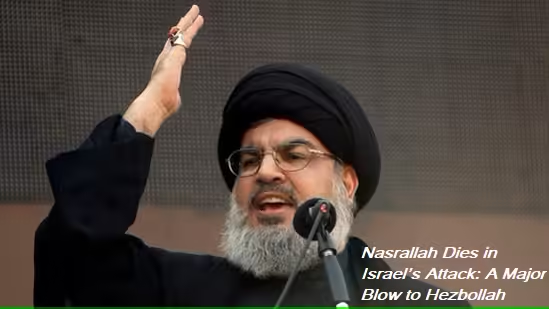
A Shocking Turn of Events in war
In a significant development today, Hassan Nasrallah, the leader of Hezbollah, has reportedly died in an Israeli airstrike. This news marks a turning point in the ongoing conflict between Israel and Hezbollah, sending shockwaves through Lebanon and the wider Middle East. Nasrallah’s death is expected to escalate tensions in the region, where Hezbollah has long been a dominant force.
The Attack: Israel’s Strike on Hezbollah
According to reports, Nasrallah was killed during a targeted airstrike by Israeli forces aimed at Hezbollah positions in Lebanon. The attack comes amidst heightened hostilities between Israel and Hezbollah, which have been on the rise for months. The Israeli military confirmed the strike, stating that it was part of ongoing efforts to dismantle Hezbollah’s military infrastructure and leadership.
Nasrallah, who had led Hezbollah since 1992, was known for his defiant stance against Israel and played a central role in shaping the group’s policies and military strategies. His death is seen as a major victory for Israel but also raises concerns about the retaliatory actions Hezbollah might take in the wake of this loss.
Who Was Hassan Nasrallah?
Hassan Nasrallah was the Secretary-General of Hezbollah, one of the most powerful and influential political and military organizations in Lebanon. He rose to prominence in the 1990s, guiding Hezbollah through wars with Israel and solidifying its position as a dominant force in Lebanese politics.
Nasrallah was revered by many as a symbol of resistance against Israel and the West, especially after the 2006 war between Hezbollah and Israel. Under his leadership, Hezbollah expanded its influence in the region, both politically and militarily, making it a key player in Lebanon’s political landscape.
The Impact of Nasrallah’s Death on Hezbollah
Nasrallah’s death is a significant blow to Hezbollah, which has relied heavily on his leadership and strategic vision. His death leaves a leadership vacuum that could destabilize the group and its operations, both in Lebanon and across the region.
However, Hezbollah has a well-established hierarchy, and it is expected that a successor will be named soon. Still, the loss of Nasrallah is likely to weaken the group’s morale and disrupt its plans, at least in the short term. Many experts believe that this could lead to a period of internal strife within Hezbollah as different factions vie for power.
Potential Regional Fallout: A New Wave of Violence?
With Nasrallah’s death, there is a high probability of retaliation from Hezbollah. The group has previously vowed to respond with force to any significant attacks on its leadership. This could trigger a new wave of violence between Israel and Hezbollah, with both sides escalating the conflict.
The region, already fraught with tensions, could see an increase in violence not only in Lebanon but also across neighboring countries where Hezbollah has influence, such as Syria. There is also concern that this could draw in other regional players, further complicating an already volatile situation.
A Pivotal Moment in Middle Eastern Politics
The death of Hassan Nasrallah marks a pivotal moment in the ongoing conflict between Israel and Hezbollah. While it represents a major achievement for Israel, it also sets the stage for potential reprisals and further instability in Lebanon and the broader Middle East. As Hezbollah grapples with the loss of its leader, the region braces for the uncertain days ahead.